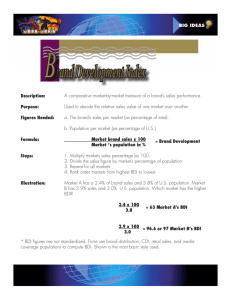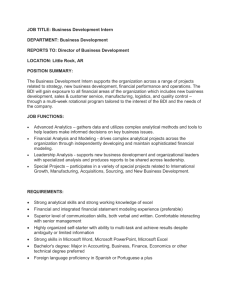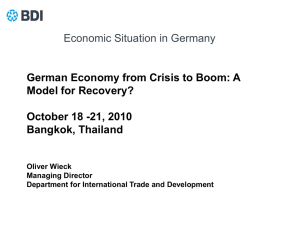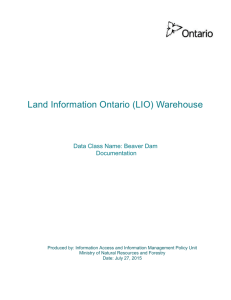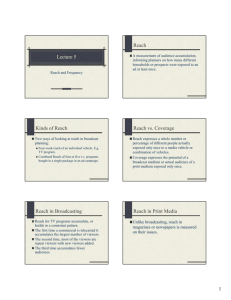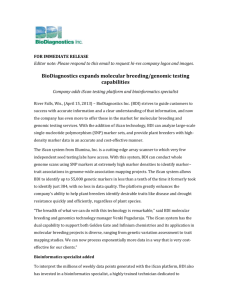in the court of appeals of iowa
advertisement
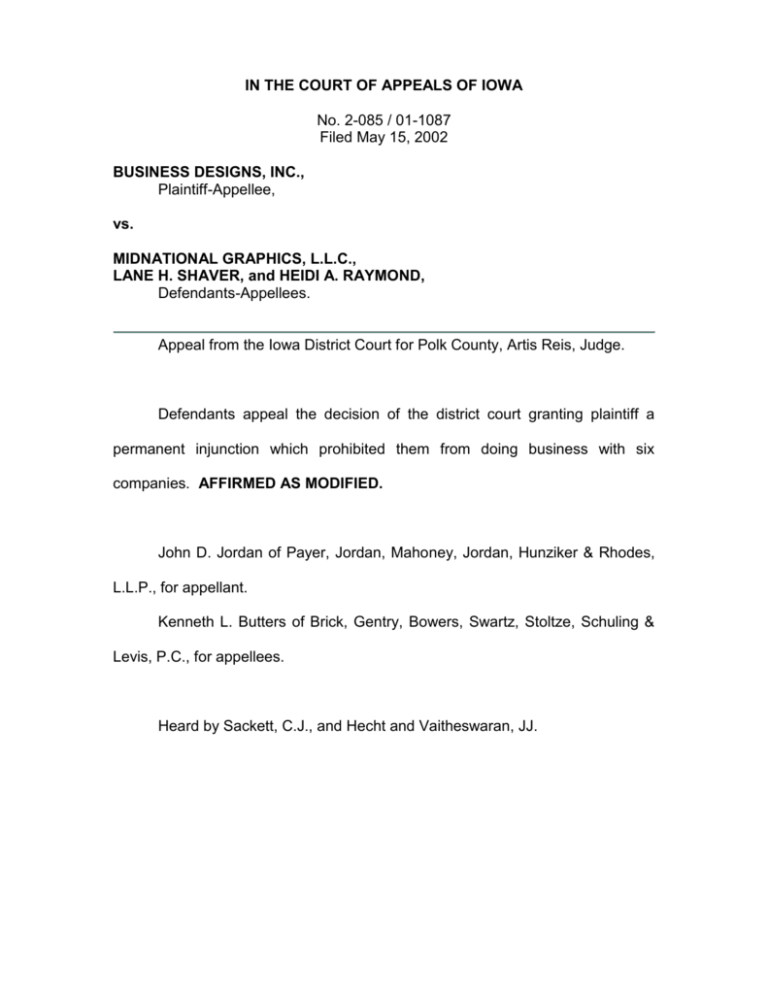
IN THE COURT OF APPEALS OF IOWA No. 2-085 / 01-1087 Filed May 15, 2002 BUSINESS DESIGNS, INC., Plaintiff-Appellee, vs. MIDNATIONAL GRAPHICS, L.L.C., LANE H. SHAVER, and HEIDI A. RAYMOND, Defendants-Appellees. Appeal from the Iowa District Court for Polk County, Artis Reis, Judge. Defendants appeal the decision of the district court granting plaintiff a permanent injunction which prohibited them from doing business with six companies. AFFIRMED AS MODIFIED. John D. Jordan of Payer, Jordan, Mahoney, Jordan, Hunziker & Rhodes, L.L.P., for appellant. Kenneth L. Butters of Brick, Gentry, Bowers, Swartz, Stoltze, Schuling & Levis, P.C., for appellees. Heard by Sackett, C.J., and Hecht and Vaitheswaran, JJ. 2 SACKETT, C.J. Defendants appeal the decision of the district court granting plaintiff a permanent injunction which prohibited them from doing business of any kind with six companies. Defendants claim: (1) the process of designing, producing, and marketing car wash signs does not constitute a trade secret; (2) the alleged trade secrets did not derive independent economic value because they were not generally known; (3) plaintiff did not make reasonable efforts to maintain secrecy of the alleged trade secrets; and (4) the permanent injunction was overly broad. We affirm as modified on appeal. James Benn owns Business Designs, Inc. (BDI). The company utilized digital thermal resin transfer imaging, and specialized in producing signs and decals advertising car washes for service stations. When Benn began the company in 1992, he spent about five months experimenting with materials to develop a product that would hold up in outdoor conditions and finding the best places to put them to maximize car wash sales. As the company expanded, Benn hired Lane Shaver and Heidi Raymond. Because it was a small business, Shaver and Raymond were cognizant of all aspects of the business. Over time, Shaver and Raymond became dissatisfied with their employment at BDI. Shaver discussed the situation with a former employer, Dennis Lumbard. In July 2000, Lumbard decided to start a new company, MidNational Graphics, L.L.C., which would engage in digital thermal resin transfer imaging. Shaver and Raymond resigned at BDI on August 7, 2000. Shaver's last day of work was August 15, 2000, and Raymond's last day was August 18, 2000. 3 Immediately after leaving BDI, Shaver and Raymond began working for MidNational, where they are the only two employees. Within about one week, MidNational was able to ship full sign packages to former customers of BDI, which were very similar to those produced by BDI. MidNational sent out detailed price lists for numerous products which were also produced by BDI, but MidNational's prices were slightly lower. Both Benn and Shaver testified that BDI and MidNational produced high quality products, and that there were very few competitors which had products at this level of quality. By April 20, 2001, MidNational had done business with twenty-six of BDI's former customers, and most of MidNational's profits came from these former BDI customers. On October 19, 2000, BDI filed suit against MidNational, Shaver, and Raymond on theories of conversion and taking trade secrets. BDI also filed an application to temporarily and permanently enjoin defendants from engaging in business with six customers which generated a large amount of sales for MidNational, but had been former BDI customers. A hearing on the injunction was held in May 2001. The district court found Shaver, Raymond, and Lumbard were not credible witnesses. The court concluded: The information taken by the Defendants and utilized immediately in their own business in competition with Plaintiff are Trade secrets as defined in Iowa Code Section 550.2(4). The Trade secrets of Defendant taken and utilized by Defendants include information relating to the methods of production; products used; marketing and pricing of BDI's car wash signage and decals. Defendants shamelessly attempted to usurp large portions of Plaintiffs business by using Trade secrets of Plaintiff. The court also found BDI had a reasonable expectation defendants would not use its trade secrets to compete against it. The court enjoined defendants "from 4 doing business of any kind or nature" with these customers: CJ Cox Corporation; Car Wash Equipment & Supplies; D/S Car Wash Equipment; Fleetwash Systems; Grant Sales; and Hill & Foss, Inc. Defendants appealed. I. Scope of Review. The parties disagree about whether this case was brought at law or equity, and our scope of review. A request for an injunction invokes the district court's equitable jurisdiction. Iowa Supreme Court Comm’n v. A-1 Assocs., Ltd., 623 N.W.2d 803, 805 (Iowa 2001). We find this case was filed in equity and our review is de novo. Iowa R. App. P. 6.4. The request for an injunction was filed separately from the petition seeking damages. In equity cases, especially when considering the credibility of witnesses, the court gives weight to the fact findings of the trial court, but is not bound by them. Iowa R. App. P. 6.14(6)(g). II. Information. Defendants contend the process of designing, producing, and marketing car wash signs and decals is not the type of information which would constitute a "trade secret" under Iowa Code section 550.2(4) (1999). They claim there was nothing unique or secretive about the signs and decals produced by BDI. The owner of a trade secret may petition the court to enjoin an actual or threatened misappropriation of the trade secret. Iowa Code § 550.3; 205 Corp. v. Brandow, 517 N.W.2d 548, 550 (Iowa 1994). "Trade secret" is defined as follows: "Trade secret" means information, including but not limited to a formula, pattern, compilation, program, device, method, technique, or process that is both of the following: 5 a. Derives independent economic value, actual or potential, from not being readily ascertainable by proper means by a person able to obtain economic value from its disclosure or use. b. Is the subject of efforts that are reasonable under the circumstances to maintain its secrecy. Iowa Code § 550.2(4). Trade secrets can include customer, financial, and manufacturing process information, as well as the composition of products. Revere Transducers, Inc. v. Deere & Co., 595 N.W.2d 751, 776 (Iowa 1999). Business information may be considered a trade secret, including customer lists, sources of supplies, confidential costs, and price data. U.S. West Communications, Inc. v. Office of Consumer Advocate, 498 N.W.2d 711, 714 (Iowa 1993). Our supreme court has stated, "There is virtually no category of information that cannot, as long as the information is protected from disclosure to the public, constitute a trade secret." Id. The district court found methods of production, products used, marketing, and pricing of car wash signs and decals were trade secrets. We agree that this type of information may be considered a trade secret. III. Independent Economic Value. Defendants claim BDI failed to show the alleged trade secrets had independent economic value, as required by section 550.2(4)(a). They state the alleged trade secrets were ascertainable by proper means. They point out others could buy the equipment used to produce the signs. They also testified they were able to obtain names of potential customers from the internet, so they did not need to use BDI's customer lists. 6 In considering whether a trade secret has economic value, we consider whether the information protects the owner's competitive edge or advantage. Olson v. Nieman's, Ltd., 579 N.W.2d 299, 314 (Iowa 1998). "[I]nformation kept secret that would be useful to a competitor and require cost, time and effort to duplicate is of economic value." U.S. West, 498 N.W.2d at 714. A plaintiff must show the information was unknown to, and not readily ascertainable by, a person who would profit from its disclosure or use. 205 Corp., 517 N.W.2d at 550. Benn testified it took him about five months to find the proper materials and proper method to produce signs that would hold up in outdoor conditions. He also did research to determine the best locations for the signs in order to maximize the number of customers buying a car wash. This information gave BDI a competitive advantage. It is clear the information would be useful to a competitor, as it turned out to be very useful to MidNational. Defendants' claims that the information possessed by BDI was readily available to others is negated by Shaver's testimony that no other competitors, other than MidNational, had a product of the same high quality as BDI. Also, although defendants claimed they obtained a list of potential customers from the internet, almost eighty-five percent of its business was generated by former BDI customers. For all of these reasons, we determine the trade secrets in this case had economic value. IV. Reasonable Efforts. Defendants contend the information in this case was not "the subject of efforts that are reasonable under the circumstances to maintain its secrecy." See Iowa Code § 550.2(4)(b). They point out BDI did not require them to sign noncompetition agreements, and there was no written confidentiality policy. 7 A plaintiff must show the trade secret was the subject of efforts that are reasonable under the circumstances to maintain its secrecy. Revere Transducers, 595 N.W.2d at 776. The key element to this test is found in the words "reasonable under the circumstances." 205 Corp., 517 N.W.2d at 551. We may consider the special needs of the business claiming a misappropriation of trade secrets. Id. In 205 Corporation, plaintiff claimed its recipe for pizza crust was a trade secret. The evidence showed none of the company's recipes was given to the public. The crust recipe, however, was known to all the employees because pizza crust was made every day. There was conflicting evidence on the issue of whether these employees considered the crust recipe confidential. The supreme court determined, "Given the evidence of the special needs inherent in crust preparation, we think substantial evidence supported the conclusion that plaintiff's secrecy procedures were reasonable under the circumstances." Id. BDI did not do much internally to underscore to Shaver and Raymond that they should not reveal its trade secrets to competitors. As BDI, points out, however, it was a small company--only Benn, Shaver, and Raymond worked there. Because it was such a small company, Shaver and Raymond were cognizant of all aspects of the business. Benn testified he felt they were all friends, and in order to maintain a congenial office atmosphere he did not require written non-compete agreements. Furthermore, BDI did not reveal its methods and means of production, price lists, or customer lists to any competitors. There was no evidence to show this information was ever disclosed to third parties. 8 See Olson, 579 N.W.2d at 314. We find BDI's efforts to keep its trade secrets secret were reasonable under the circumstances of this case. V. Extent of the Injunction. Defendants claim the permanent injunction was overly broad because it enjoined them "from doing business of any kind or nature" with six customers. An injunction should be limited to the requirements of the case. 205 Corp., 517 N.W.2d at 552. Defendants state that if they produce signs from new technology not currently utilized by BDI, they should not be enjoined from selling it to these customers. On this issue BDI agrees with defendants. In its brief, BDI states: If Appellants develop new technology, which was not being utilized by BDI at the time that the Appellants were selling car wash signage and decals to the six targeted customers, then in that event, Appellant should be allowed to make sales to these six targeted customers. BDI asserts that because it was primarily involved in digital thermal resin transfer imaging, defendants should be enjoined from using any digital method, but should be free to use other methods to create signs for the six customers in question or any other customers. We modify the injunction to prohibit defendants only from using digital thermal resin transfer imaging to create products for the six customers listed in the injunction. We affirm the decision of the district court to issue an injunction due to defendants' misappropriation of BDI's trade secrets. We modify the scope of the injunction as outlined above. Costs of this appeal are assessed to defendants. AFFIRMED AS MODIFIED. Hecht, J., dissents. 9 HECHT, J. (dissents) I respectfully dissent. I agree with the majority’s conclusion BDI has satisfied the "independent economic value" prong of the trade secrets test under section 550.2(4)(a); however, I do not believe BDI proved the "reasonable efforts under the circumstances to maintain secrecy" prong of the test under section 550.2(4)(b). The requirement of reasonable efforts lies in the fact that if the plaintiff has allowed his trade secret to fall into the public domain, he would enjoy a windfall if permitted to recover damages merely because the defendant took the secret from him, rather than from the public domain as it could have done with impunity. Rockwell Graphic Systems, Inc. v. DEV Industries, Inc., 925 F.2d 174, 179 (7th Cir. 1991) (citations omitted) (holding existence of reasonable efforts was a genuine issue of material fact in that case). Reasonable efforts “put prospective infringers on notice about the existence of a right and serve as evidence of the fact that the secret is worth protecting legally.” Merges, et al., Intellectual Property in the New Technological Age, at 59 (1997) (citations omitted). Furthermore, reasonable efforts serve “a notice function, akin to ‘marking’ products with patent numbers, copyright symbols, or trademark symbols.” Id. Examples of actions which may be undertaken to maintain secrecy include: 1) requiring employees to sign confidentiality agreements or otherwise advising them of the confidential nature of the process; 2) posting of warning or cautionary signs, or placing legends on documents; 3) taking precautions regarding visitors, by requiring them to sign confidentiality agreements, having them sign in, and shielding the process from their view; 4) segregating information, so that no one person or written source discloses the entire 10 manufacturing process; 5) using unnamed or code-named ingredients; and 6) keeping secret documents under lock. Elm City Cheese Co., Inc. v. Federico, 752 A.2d 1037, 1049 (Conn. 1999) (citing 1 R. Milgrim, Trade Secrets § 1.04, at 1-178 to 1-189 (1999)). Although this list is merely demonstrative of how a party can protect the secrecy of its trade secret, it is significant BDI failed to take any of these affirmative steps. See Gillis Associated Industries, Inc. v. Cari-All, Inc., 564 N.E.2d 881, 886 (Ill. App. Ct 1990) (holding some affirmative step must be taken to maintain the trade secret). "It would be anomalous for the courts to prohibit the use of information that the rightful owner did not undertake to protect." Dicks v. Jensen, 768 A.2d 1279, 1284 (Vt. 2001) (finding summary judgment was appropriate because employer had not demonstrated that he took reasonable efforts to maintain secrecy). Several courts have found the failure to take reasonable efforts disqualifies a plaintiff from trade secret protection. See, e.g., Defiance Button Machine Co. v. C & C Metal Products Corp., 759 F.2d 1053, 1063 (2nd Cir. 1985), cert. denied, 474 U.S. 844, 106 S. Ct. 131, 88 L. Ed. 2d 108 (1985) (holding information loses the protection of trade secret law if owner fails to take reasonable precautions); Rogers v. Desa Int’l, Inc., 183 F. Supp. 2d 955, 958 (E.D. Mich. 2002) (finding plaintiff's invention "cannot qualify for trade secret protection because he made no efforts whatsoever to maintain secrecy"); Southwest Whey, Inc. v. Nutrition 101, Inc., 117 F. Supp. 2d 770, 780 (C.D. Ill. 2000) (granting summary judgment because plaintiff has "failed to take any reasonable efforts to maintain the secrecy of the trade secrets"); Motor City Bagels, L.L.C. v. American Bagel, Co., 50 F. Supp. 2d 460, 480 (D. Md. 1999) 11 (granting defendant's motion for summary judgment for trade secret misappropriation due to plaintiff's failure to take reasonable efforts to ensure secrecy); Nordale, Inc. v. Samsco, Inc., 830 F. Supp. 1263, 1274-75 (D. Minn. 1993) (granting summary judgment on trade secrets claim where no reasonable efforts to maintain secrecy); Electro-Craft Corp. v. Controlled Motion, Inc., 332 N.W.2d 890, 903 (Minn. 1983) (finding plaintiff failed to establish trade secret because “evidence does not show [plaintiff] was ever consistent in treating the information here as secret”); Zemco Mfg., Inc. v. Navistar Int’l Transp. Corp., 759 N.E.2d 239, 250 (Ind. App. 2001) (granting defendant's motion for summary judgment because plaintiff "did not make reasonable efforts under the circumstances to maintain the secrecy of its proprietary information, and therefore, the information is not properly classified as a trade secret"). Cf. Uncle B’s Bakery, Inc. v. O’Rourke, 920 F. Supp 1405, 1413-15, 1429, modified, 938 F. Supp. 1450 (N.D. Iowa 1996) (finding reasonable efforts to maintain secrecy of bagel recipe and sealing process where all visitors signed confidentiality agreements, and all employees signed nondisclosure agreements); APAC Teleservices, Inc., v. McRae, 985 F. Supp. 852, 865 (N.D. Iowa 1997) (finding non-disclosure agreements constituted a reasonable effort under the circumstances to protect secrecy of trade secrets); Olson v. Nieman’s, Ltd., 579 N.W.2d 299, 314 (Iowa 1998) (holding jury question was generated on reasonable efforts issue due to stamp on schematic with word “inventor”). The majority finds BDI “did not do much internally,” but concludes "this was reasonable under the circumstances," citing 205 Corporation v. Brandow, 517 N.W.2d 548 (Iowa 1994). I do not believe 205 Corporation supports the 12 majority’s conclusion. In 205 Corporation, the plaintiff took efforts to maintain secrecy. 205 Corp., 571 N.W.2d at 551. The defendant "was told the recipes were confidential and were not to be left anywhere readily accessible to others." Id. Furthermore, "all recipes, including the crust recipe, were in a safe deposit box at all times." Id. Although the crust recipe was known to all kitchen employees, the court concluded that fact alone did not diminish the "plaintiff's secrecy procedures." Id. In this case, BDI did not require the defendants to sign non-compete agreements and did not have a written confidentiality policy. Indeed, BDI attempts to justify its failure to take affirmative measures to keep its information secret by asserting that the defendant employees were the owner’s friends. In my view, BDI’s inadvertent concealment of its information from competitors or third parties does not constitute reasonable efforts to maintain secrecy. If, as the majority concludes, inadvertent concealment of information will suffice to engender trade secret protection, the reasonable efforts prong of section 550.2(4)(b) is effectively obviated. Accordingly, I would reverse the decision of the district court.

